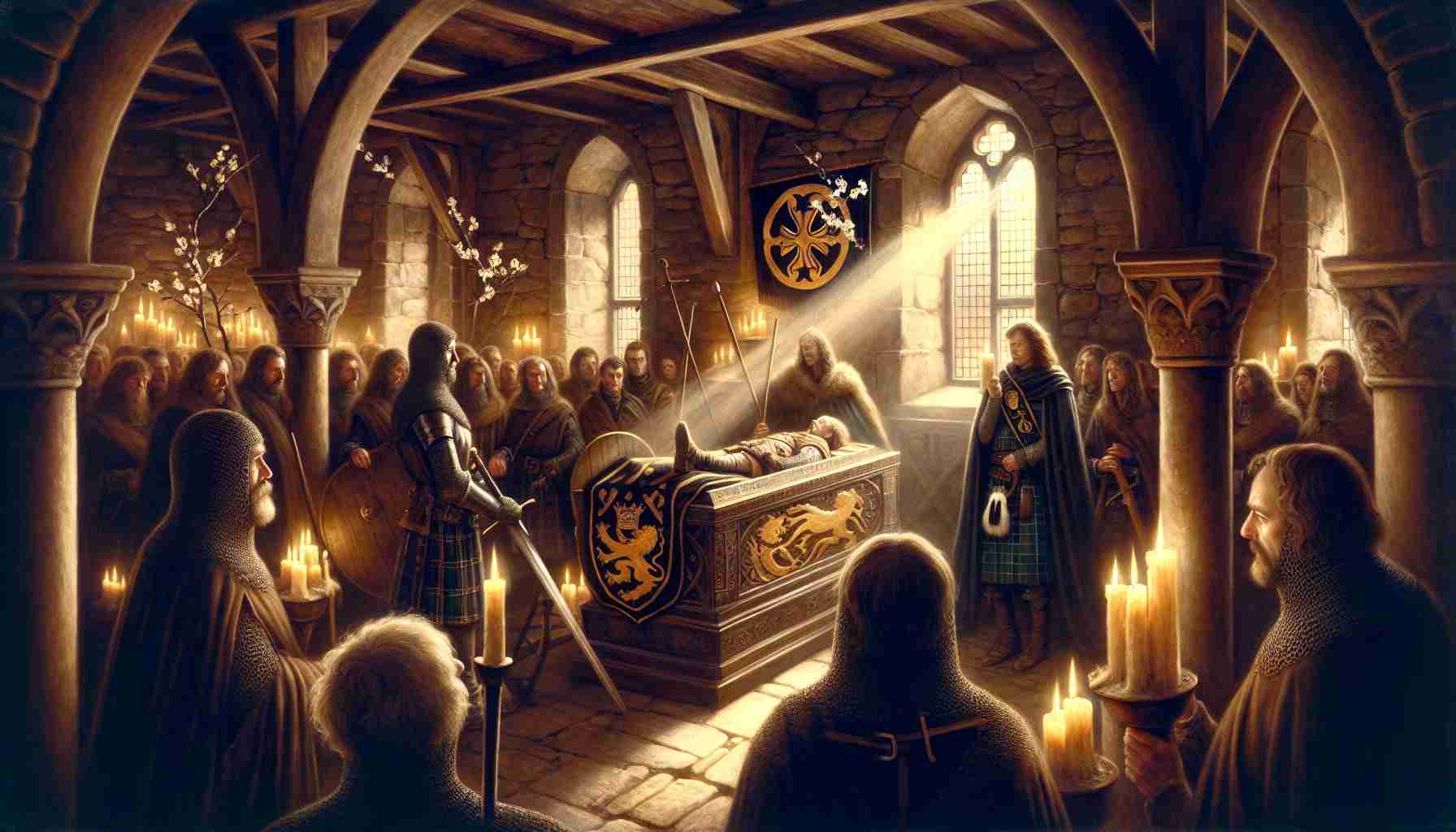

The stone walls of Cardross Castle whispered with midsummer wind, soft as a psalm. June 7, 1329—Scotland bowed beneath gray skies as its king, Robert the Bruce, surrendered to death.
Once crowned in defiance beneath the shadowed halls of Scone, Bruce had risen from outlaw to sovereign, from excommunicated murderer to the liberator of a nation. More warrior than courtier, more sinner than saint, yet it was not the glint of Bannockburn’s sword that stirred the land now, but a final breath drawn in penitence. The plague had not claimed him. Nor the sword. But time itself—unyielding—had laid him low, leaving behind the crumbling witness of a heart burdened less by conquest than by contrition.
“Create in me a clean heart, O God; and renew a right spirit within me,” he had often uttered, the lines of Psalm 51 pressed upon his soul like the iron of his helm once pressed his brow.
Now, beyond the castle’s casement, bells tolled from the priory he had long since raised with silver offerings. A chapel for the Cistercians. A monastery for the Benedictines. He had given away his gold not in pride, but pleading—seeking redemption for the sin that exiled him from Rome: the murder of John Comyn before the high altar of Greyfriars Kirk.
The cavernous silence that followed that fateful betrayal had haunted Bruce’s reign. Yet in his repentance, he rebuilt what he had shattered. While others tore banners from steeples, he cloaked monks in wool and stone, re-founding Arbroath, Melrose, and Cambuskenneth—all to restore what ambition had desecrated.
When the call to crusade never returned, he fashioned one of his own. "If I cannot go to Jerusalem," he had said, "then let my heart go in my place." And so they came, the bravest of his knights, standing now by his breathless chamber. James Douglas, the Black Knight of Liddesdale, vowed he would carry Bruce’s heart, sealed in a silver casket, across the sea to the Holy Land. There, amidst the sands of Outremer, it would find its peace.
In death, as in rule, the king remained flawed—yet faithful. Flawed, in the blood upon his hands. Faithful, in the blood he shed to win liberty not for self, but for Scotland’s soul. At Bannockburn he had stood firm, two years after Rome lifted his excommunication, two years after he rebuilt a sanctuary in Dunfermline where traitors once lingered. Beneath the banners of saints embroidered by Highland women, he had prayed before battle. For God. For country. For absolution.
The battle itself had been a baptism of earth and sinew—the flower of English chivalry splintered by Scottish axes. It was not strategy alone that earned victory, but the unwavering belief that God had not forsaken a penitent king.
Even Edward II could not deny it. Even the Pope, once his fiercest accuser, declared that Scotland’s freedom was God’s justice fulfilled. The realm would remain Christian, unshackled from foreign rule. Not just free, but faithful.
Now, the flickering candle by Bruce’s bedside guttered. The priest’s chant gave way to silence. Gentle hands performed rites over skin still calloused from war, as men across the glens kept vigil with breathless awe—not for a man who had ruled, but for the mercy he had pursued.
By dawn, the heart was sealed. Thirty knights assembled beside the Clyde, Douglas bearing the vessel upon his chest. They rode south, carrying the relic through France to Spain, where they joined the siege of Moors at Teba. There, encircled, Douglas hurled the casket into Saracen lines, shouting: “Lead on, brave heart, as thou wert wont!”
Douglas fell. The heart was recovered. And though it never reached Jerusalem, it was returned, by miracle and mourning both, to Melrose Abbey—cradled in consecrated ground where Bruce had once bent the knee.
Years passed. Kings rose, and wars returned. But in the memory of a nation, only one lay in state both in Dunfermline and in Melrose. Only one had asked not for glory, but for grace.
Now, beneath cool Highland mists, pilgrims often find the Chapel at Melrose and kneel above the stone that bears no name. They know who rests there. Not all of him—but the best of him. A heart once stained with guilt, now quiet with faith.
Each June, when grass bends with wind and Psalms are sung in shadowed sanctuaries, Scotland remembers. For Robert the Bruce had asked of Heaven not to be remembered as king—but as a man who dared to believe that even robbers of altars might be called sons again.
And God, it seemed, had answered.